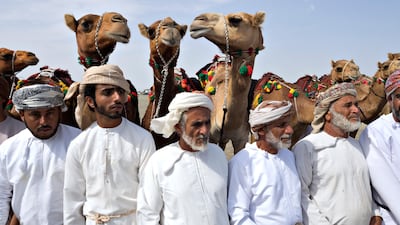Looking out from the top of a sand dune in central Oman, Mohammed Al Shatry, 79, sees not just a sprawling desert but his home and that of his ancestors. But not for much longer.
The government has given Mr Al Shatry and 15 other families who live in the Bedouin village of A’saadiyah 18 months to move to a new town being built 20 kilometres away, to make way for the construction of a highway.
"I was born next to that thorny tree where the tents of my parents were. I was taught to read and write in another tent a few metres away with 20 other children. Most of these people are still around in A'saadiyah," Mr Shatry told The National.
"It is our home and now they ask us to leave everything behind,”
Hamood Al Fezari, 81, the village’s Quran teacher and imam of the local mosque, said the government was oblivious to the disappearance of Bedouin culture as a price for modernisation.
“The government is making a mistake by destroying an ancient tradition. A country cannot move forward if its background is erased as it if were writing on the wall,” Mr Al Fezari said.
But the winds of change are sweeping desert areas across Oman, affecting about 6 per cent of the country's 2.45 million citizens.
Deep in the Wahiba Sands in the eastern region, villagers in the once peaceful oasis of Hamrah can only watch unhappily as the government builds housing for low-income citizens nearby.
Said Al Shehri, a 76-year old poet, stood outside his tent tugging at his white beard as lorries delivered bricks and cement to the site barely a kilometre away.
“The peace and tranquility have gone forever. The water of the stream is now dirty from the dust of the construction, the air is polluted and the wind has different echoes,” Mr Al Shehri said.
His wife Khadija is worried because her tent-making business has taken a dive in the past five years.
“Bedouins live in tents, not houses. These new houses are taking away my business as Bedouins now are forced to abandon their villages,” she said.
____________________________________
Read more:
Oman wildlife rangers losing the battle to poaching and housing estates
Omani workers call on government to increase minimum wage
Glow in the dark camels: keeping you safe on the roads of Oman
_____________________________________
Animal husbandry, a key part of Bedouin life, is also under threat.
“The Bedouin supply a lot of animals like sheep, goats, cows and camels for meat and milk. About a quarter of all the meat and milk supply in Oman come from their villages," said Ghalib Al Gharbi, a food distributor in Muscat.
"Because these products are homegrown, they are sold at economical prices. If you take away their villages then you take away their livelihood and an important supply of food as well.”
Tour guides say the abandoning of Bedouin villages will affect tourism as well.
“Tourists are fascinated by the Bedouin and their way of life. They come all the way from their countries to see this. They don’t see them anywhere but a handful of countries, and Oman is one of them. Tourists take pictures with them, buy their art and want to know more about their history," said Faisal Al Naamani, a tour guide working in the Sharqiyah region.
"If the Bedouin disappear then we take away an important part of the tourism business,” he said.
An official from the housing ministry said the construction of housing was meant to help all low-income citizens, regardless of their background.
“We respect their [Bedouin] way of life but these new houses also help them to integrate with society by raising their living standards. For example, Bedouins need to get education and better medical attention," the official said.
"We don’t force them — it is voluntary for them to move into the new areas if they live in poverty.”
Rashed Al Dhahri, 46, a man with Bedouin ancestry who lives in Muscat, said the government needed to reserve areas for the tribes who do not want to integrate with the rest of the society.
“There should be areas that are untouchable, where no roads will pass or new housing will be built. These will be the ancient Bedouin reservations that will preserve their traditions and culture," said Mr Al Dhahri, who works as a computer networks engineer.
"We have the obligation to keep such customs alive. If we take that away, we also take a big part of our history.”

